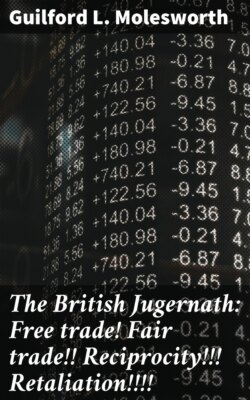Читать книгу The British Jugernath: Free trade! Fair trade!! Reciprocity!!! Retaliation!!!! - Guilford L. Molesworth - Страница 11
На сайте Литреса книга снята с продажи.
CHAPTER V. AXIOMS FOR JUGERNATHIANS.
ОглавлениеTable of Contents
| Axiom. | Action of Free-Trade. | |
| (1.) | The object of political economy is to increase the wealth and power of a country.[3] | Free trade attaches more importance to consumption than to productive industries. |
| (2.) | The riches or power of a country is in proportion to its produce.[3] | |
| (3.) | Industries, or the produce of the land and labour, are the REAL WEALTH of the country.[3] | Free trade destroys the sources of employing productive labour. |
| (4.) | The requisites of production are Labour, Capital and Land.[4] | |
| (5.) | Parsimony, not industry, is the immediate source of increase of capital.[3] | Free trade promotes consumption rather than parsimony. |
| (6.) | Capital is wealth appropriated to reproductive employment.[4] | Free trade is rapidly driving capital to Protectionist countries. |
| (7.) | Industries are limited by capital, and cannot be created without capital.[5] | |
| (8.) | Increase of capital gives employment to labour without assignable limits.[5] | |
| (9.) | Productive labour is labour employed to produce a profit.[6] | Free trade makes labour unproductive |
| (10.) | Emigration of productive labour is loss of capital. The Minister of War in France asserts that every individual transported to Algeria costs the State 8,000 francs. | Free trade encourages the immigration of productive labour to Protectionist countries. |
| (11.) | Industries carried on without profit, cause loss of capital and credit. | |
| (12.) | It is demand only that causes labour and its produce to be wealth.[6] | Free trade prefers consumption to demand. |
| (13.) | To purchase produce is not to employ labour.[5] | Free trade purchases produce instead of employing labour. |
| (14.) | Capital employed on Foreign trade is less advantageously employed for society than on Home trade.[7] | |
| (In extreme cases Adam Smith shows that capital might be twenty-four times more advantageously employed on Home than on Foreign trade.) | Free trade encourages Foreign and Carrying trade, rather than Home trade. | |
| (15.) | Carrying trade is less advantageous than either Foreign or Home trade.[7] | |
| (16.) | Interest on capital is natural, lawful, and consistent with the general good.[8] | |
| (17.) | A struggle between capital and labour is the greatest evil that can be inflicted on society.[8] | Free trade leaders encourage a struggle between Labour and Capital, between Landlord and Tenant. |
| (18.) | Land let out for profit is the capital of the landlord.[9] | |
| (19.) | The capital of the employers forms the revenue of the labourer.[10] | Free trade destroys the capital of the employer. |
| (20.) | Nothing can be more fatal than the cry against capital, so often unthinkingly uttered.[9] | Free trade leaders raise this cry against the capitalist landlord. |
| (21.) | Rent does not affect the price of agricultural produce.[9] | |
| (22.) | It is to the interest of the labourer that there should be as many rich men as possible to compete for his labour.[9] | Mr. Bright says, that rich landlord capitalists are the squanderers of national wealth. |
| (23.) | Agriculture is the most advantageous employment of capital.[11] | Free trade has destroyed agriculture in England and Ireland. |
| (24.) | No equal capital puts in motion a greater quantity of productive labour than that of the farmer.[11] | |
| (25.) | Cultivated land is more advantageous than pasture.[11] (It has been computed that wheat cultivation per acre, compared with pasture land, produces eight times the quantity of human food, and employs three times the amount of labour.) | Free trade leaders urge the substitution of pasture for wheat cultivation in England. |
| (26.) | The interests of the agricultural and manufacturing classes are inseparably connected with those of the whole community. | |
| (27.) | Credit when sound is capital.[12] | Free trade is destroying credit by causing industries to work at a loss. |
| (28.) | Credit, when it exceeds the present value of future profits, is unsound. | |
| (29.) | Credit is the anticipation of future profit.[12] | |
| (30.) | Money is the accumulation of past profits. | |
| (31.) | Activity of commerce is not necessarily an indication of prosperity. | Free trade causes the commerce of Great Britain to be one of consumption rather than production, and consequently unhealthy. |
| (32.) | The true Economist pursues a great future good at the risk of a small present evil.[13] | Free trade, to avoid a small present evil, risks a national disaster. |
